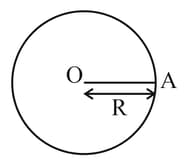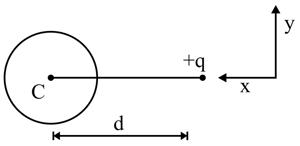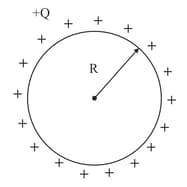Electric Potential and Potential Difference
Electric Potential and Potential Difference: Overview
This topic covers concepts, such as, Electric Potential in Terms of Electric Field, Electric Field in Terms of Electric Potential, Electric Potential due to a Charged Solid Sphere & Graph of Electric Potential Due to Charged Solid Sphere etc.
Important Questions on Electric Potential and Potential Difference
A particle of charge+q and mass m moving under the influence of a uniform electric field E enters in I quadrant of a coordinate system at a point (0, a) with initial velocity vand leaves the quadrant at a point (2a, 0) with velocity .
Find Rate of work done by the electric field at point (0, a)
A charge is placed on a large spherical conducting shell of radius . Another small conducting sphere of radius r carrying charge is introduced inside the large shell and is placed at its centre. The potential difference between two points, one lying on the sphere and the other on the shell would be:
How does the electric potential due to a dipole vary on the dipole axis as a function of – distance of the field point from the mid–point of the dipole, at large distances?
Two point charges are separated by a distance of 1m in air. Calculate at what point on the line joining the two charges is the electric potential zero.
Choose the incorrect statement
(1)The potential energy per unit positive charge in an electric field at some point is called the electric potential.
(2) the work required to be done to move a point charge from one point to another in an electric field depends on the position of the points.
(3) the potential energy of the system will increase if a positive charge is moved against the Coulomb force.
(4) None of the above.
You are to bring two charges from infinity to the points represented by the potentials and in an electric field . If the distance between within the field is , find the total work done in assembling the configuration. Imagine an electric field in a space. The potential at the origin is zero. Find the potential at the point .
identical drops each charged upto potential of are combined to form a bigger drop. The potential of the bigger drop will be _____ .
Three concentric spherical metallic shells and of radius and respectively have surface charge densities and , respectively. The shells and are at same potential. If the radii of are and , respectively. The radius of shell is _____.
For a uniformly charged thin spherical shell, the electric potential radially away from the centre of shell can be graphically represented as

Electric potential at a point due to a point charge of is . The distance of from the point charge is:
(Assume, )
An uncharged conducting sphere is placed near to a charge as shown in the figure. The distance between charge and the sphere is d. Find the magnitude of the electric field produced by induced charge at the centre of the sphere.

The potential of the field inside a charged sphere depends upon the distance from its centre the point under consideration in the following way: where and are constants If the charge is uniformly distributed within the sphere, then the value of is
identical balls made of conducting material each having potential of are joined to form a bigger ball. The potential of bigger ball is _____ .
Potential at the surface of a uniformly charged non-conducting sphere is . Then the potential at its centre is
Find the distance from a point charge of magnitude , where electric potential is
Pick the correct graph between potential at distance from centre for the uniformly charged spherical shell of radius .
In a certain field, the potential energy is , where and constants. The particle is in stable equilibrium at equal to
If of work must be done to move electric charge of from a place where
potential is to another place where electric potential is volt. Find the value of
From a point if we move in a direction making an angle & measured from axis, the potential gradient is given as . Find the direction and magnitude of electric field at that point.
The electric potential on the surface of a sphere of radius due to a charge is . The intensity of electric field on the surface of the sphere in
